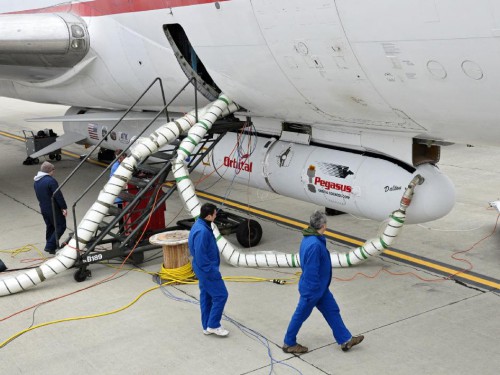
The launch of an Orbital Sciences Corporation Pegasus XL rocket with NASA’s Interface Region Imaging Spectrograph (IRIS) will have to wait a little longer. The launch is now slated to take place at 7:27 p.m. PDT (10:27 p.m. EDT) Thursday, June 27, from Vandenberg Air Force Base (VAFB) in California.
NASA has issued a release about the delay and stated that coverage of the launch will begin at 6 p.m. PDT.
The slip was caused by what has been called a “significant” power outage that occurred at VAFB’s Western Range facilities. Therefore the range was unable to support the previous launch date and time. Officials responsible for the Western Range have stated that they believe they should have the power issues resolved, as well as the affected facilities, in time for the planned launch Wednesday evening.
A Launch Readiness Review will be held tomorrow (Wednesday) to ensure that this is in fact the case.
Orbital’s Pegasus XL rocket is scheduled for launch from Orbital’s L-1011 carrier aircraft within the middle of this window.
The IRIS mission is part of the space agency’s Explorer Mission. It will monitor how solar matter moves and how it gathers energy and heats up as it traverses the little-known medium that is the Sun’s atmosphere. Interactions between the various layers affects and drives what is known as the solar wind.
The Pegasus XL will be dropped from the Pegasus L-1011 carrier aircraft above the Pacific Ocean at an altitude of about 39,000 feet about 100 miles northwest of VAFB.
Want to keep up-to-date with all things space? Be sure to “Like” AmericaSpace on Facebook and follow us on Twitter: @AmericaSpace
Missions » IRIS »




One Comment
One Ping
Pingback:Pegasus-XL Boosts NASA’s IRIS Sun-Watcher into Orbit « AmericaSpace